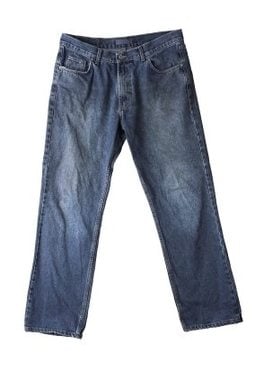The Story of the $800 Jeans
His talk was essentially an exploration into the psychology of shopping. I laughed as he (the journalist) expressed his disappointment at test-driving a pair of $800 jeans which looked, felt and ‘performed’ the same as his $50 jeans. Not only was there no discernible difference (to him), but over an entire week of wearing his new expensive duds, not one person complimented him on how amazing he (or they) looked. “Then, what’s the point?”, he asked. I know the Feeling I identified with this story because I was given an expensive pair of jeans for a birthday a few years back. While I appreciated the gift and wore them gratefully, I had no idea that they were expensive until someone (some months later) saw the label and complimented me on owning a pair of that particular brand of jeans. I nearly fell over. Of all the things to be complimented on, the brand of my jeans wasn’t high on my list. I was amazed that they could be impressive to someone. To me, they were simply one of the five (or so) pairs that I owned. No better or worse than any of my other ($50) jeans. What Logic? I was extremely interested in Wallace’s study and subsequent report as I have a fascination in this area; the value we place on labels. Having worked with a broad socio-economic cross-section of people over the last two and a half decades has given me a great opportunity to observe ‘shopping behaviour’ and the rationale behind those purchases first hand. Like my client who would never buy a pair of shoes unless they cost at least a thousand dollars because “they couldn’t be any good otherwise”. Or the forty-something guy who bought himself a high-powered Ducati motorbike even though he was a complete novice with no riding experience or skills. When I (an experienced motorcyclist) advised him to buy a different (cheaper, safer, slower, more appropriate, learner-friendly) bike, he didn’t want to hear about it. He was only interested in the look and the label of the bike; he wanted to be a Ducati owner no matter what. 300 Kilometres Later… When he got the bike it absolutely scared the crap out of him (because he couldn’t ride it); as I knew it would. I had to ride it home from the dealership for him. He rode it three times (in a year), put 300 kilometres (180 miles) on the clock and then sold it for $9,000 less than the purchase price. He was in love with the ‘theory’ of a Ducati but not the practical reality. He had bought an image, an idea, a brand. A delusion. And as so many of us do from time to time, he let his ego run the show, dictate his behaviours and waste his money. He wanted to be a Ducati owner and rider so much that his emotion (need to be cool, popular, desirable, respected, tough, macho) temporarily over-shadowed his intelligence, common sense, fear and his obvious lack of riding ability. Label Lunacy People who shop for particular labels and brands rather than individual products which will suit a purpose or meet a need, have always intrigued me. It’s no revelation to hear that some people are devoted to, if not completed addicted to, owning certain brands and labels – and not because of the actual product but because of the perceived prestige (acceptance, approval, recognition, popularity) that comes from owning, wearing, drinking, driving that particular label or brand. Don’t believe me? Hang out with some teenagers for a while and see what it means to own the right shoes, jeans, jacket, MP3 player, phone, etc. A Hypothetical:
- Most ‘BMW shoppers’ won’t even consider the new ‘Hyundai’ product – even if it comes highly recommended. They will let their feelings get in the way of the facts; the fact that it’s actually a BMW in every way except for the badge on the front. Their bias against ‘less prestigious’ brands won’t allow them to even walk into a Hyundai showroom and their ego won’t allow them to save $40,000. They would rather pay $100,000 for the SAME product, so long as they can be seen driving a Beemer. The ego is a very powerful thing and haven’t the marketing folk made that fact work for them over the years?
- Most general new-car shoppers won’t consider the new $60,000 two-door Hyundai because they perceive it to be too expensive for that brand. No matter how good the actual product (car) is. As a result, the re-badged BMW doesn’t sell strongly and dies a sad and lonely death within two years of its launch. Never to be seen again. Consequently, a generation of car drivers will miss out on the automotive luxury bargain of the decade because of brand bias, stupidity and ego. Emotional Shoppers Of course, it’s no revelation for me to tell you that when it comes to how and where we spend our money, we are often emotional and irrational beings. And yes, the marketing and branding gurus have been benefiting from, and maximising this knowledge for years. It’s their goal to evoke an emotional response (feeling, reaction, decision) from you and I so that we will buy, no matter how much we don’t need, or can’t really afford, whatever it is they’re selling. To them, common sense is the enemy; that’s why they always tell us that we ‘deserve’ their product. Of course we don’t actually need a four hundred inch flat screen television, but as they quite rightly point out, you and I have worked incredibly hard lately and why shouldn’t we reward ourselves with a ridiculously large TV? Imagine how much better our lives will be when we get that bad boy up on the wall. Just look at the couple in the advertisement… they seem very happy. Back to the Presentation… During his presentation, Wallace spoke of a study that was conducted at Stanford University in early 2008, where a group of subjects sampled two different wines; a cheaper wine ($20 bottle) and a more expensive wine (over $100). They then reported their feedback to the researchers. For this study the participants knew the value of each of the wines and as you might expect, the vast majority scored the expensive wine highest, in terms of taste and pleasure, and the cheap wine at the other end of the scale. In order to make the study even more scientifically valid and objective, the researchers conducted MRIs on the participants to see if their perceived enjoyment (of each wine) correlated with what was happening physiologically in their brain. And guess what? It did. The wine which they perceived to taste the best and give them the most pleasure actually created a comparable pleasure response in their brain. And of course, the cheap wine showed the opposite; a lower level pleasure response. Now, all those results are interesting but what’s totally fascinating is that the two wines (the cheap and the expensive) were actually…. the same wine! There was no cheaper or more expensive version; they were both a relatively cheap wine. Doh!! That’s right, not only do we have the capacity to create our own pleasure and pain but we also have the ability (via our thoughts, beliefs and expectations) to actually create significant bio-chemical changes in our brain. In other words, we can think ourselves to pleasure. Or misery. Literally. Our beliefs create our reality – even when it comes to the pleasure a cheap wine can give us. My Budget Wardrobe A few weeks ago I did one of my regular TV gigs for the show I work on. For the segment, I wore some jeans, a pair of boots and a new short-sleeved shirt. A friend of mine who is a self-confessed clothes snob and fashion aficionado informed me that “I looked great.” Here’s a snapshot of the conversation we had: Friend (F): “Hey, saw you on TV this morning, you looked great. Gorgeous shirt, that colour really suits you. Is it new?” (I was still wearing the same clothes) CH: “Thanks. Yep, new shirt. Bought it all by myself!” F: “Well done, where did you get it?” (trying to get an idea of its cost and whether or not she should like it!) CH: “Some shop in the city.” (I actually bought it at Target) F: “Was it expensive?” (knew that was coming) CH: “Not too bad; it was reduced from $150.00 to $90.00.” (complete lie, it cost $25.00!) F: (now with a look of approval on her face) “Wow, that’s cheap for a nice shirt like that. Good shopping by you. It makes such a difference when you wear quality clothes. And the jeans, they’re nice…”(searching for some more info) CH: “Yeah, picked them up when I was in the States earlier this year. They were on special for a hundred and forty bucks.” F: “Wow, that’s good value for nice jeans like those.” CH: “Now, do you want the bad news?” F: “What?” CH: “The shirt cost me twenty five bucks at Target.” F: “Did not.” CH: “Yep, it did and my expensive jeans actually cost me forty five bucks at the same store and my boots were a freebie from the good folk at ‘Caterpillar’; I did a gig for them recently. So my entire outfit, including socks and jocks, cost me less than eighty bucks.” F: (look of disbelief on face) Needless to say, the revelation of the cost and origin of my ensemble changed the dynamics and the tone of the conversation instantly. When I pointed out the obvious fact that she had been sucked into the mindset of ‘dearer always equals better’, she didn’t want to hear about it. I was informed that I “just don’t get it”. All of a sudden my “gorgeous shirt” wasn’t nearly as appealing. And of course we all know you can’t buy “gorgeous” for twenty five bucks. So why do (some) people do it? Most of us have a preference for certain labels or brands because of positive experiences we’ve had with particular products over the years – that’s understandable (intelligent even) and not what I’m talking about today. No, I’m talking about people who have an unhealthy and irrational desire to own certain labels no matter what. I’m talking about people who won’t even consider another less-expensive label – even if that label is of comparable or identical quality to the more desirable label. I’m talking about people who love to be seen drinking the expensive wine, even when it tastes like crap. And I’m talking about the person who puts him or her self under huge financial pressure to buy the car that they really can’t afford and definitely don’t need. On some level, Label Shoppers believe that ownership of a particular product will meet some kind of need in them. And they’re right. For a day. Because that’s about how long it will be before they will need to shop again. Amazingly, those $800 jeans won’t lead to life-long nirvana or universal approval or acceptance. Who’da thought? By the way, the need they have is emotional, not practical. Nobody needs thousand dollar (plus) shoes, but people want to be associated with certain labels because somewhere along their journey they’ve learned that ownership of said labels will equate to attention, approval and acceptance; what they’re really after. The Why Behind the What So again, it comes back to the ‘why’ behind the ‘what’. What they want is the label, but why they want it is the key to this puzzle. Consciously or not, many (many) people don’t believe that they’re good enough – that is, smart enough, pretty enough, desirable enough, lean enough or interesting enough. And as a consequence they will endeavour to make up for their perceived shortcomings with desirable accessories and assets; stuff to impress their peers. “They’ll like me more if I’m driving this car, wearing these clothes, living in that house or owning that gadget.” As for me, thankfully most of my friends love me unconditionally – even in my twenty five dollar Target shirt, my very cheap jeans and the boots I didn’t pay for.


